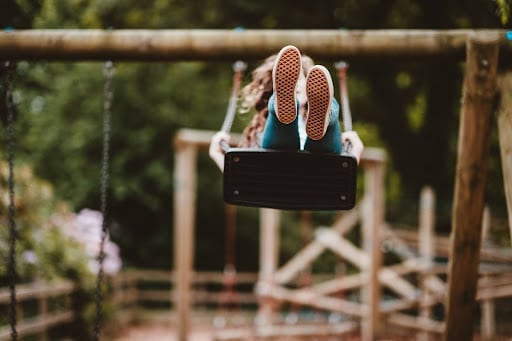Every pediatric therapist has experience working with a child with an autism diagnosis in the clinic. But have you ever treated a neurodivergent child for pelvic floor dysfunction?
Impaired sensory processing and behavioral issues of a neurodivergent child add challenging layers to a pelvic floor therapy case. Now imagine how much more difficult your treatment would be if the child couldn’t communicate.
Autism is one of many diagnoses categorized under the umbrella of “neurodivergent” disorders. Not every child with a neurodivergent disorder will have pelvic floor dysfunction, but these disorders will surely affect how you treat the child’s bowel or bladder issues.
If you’re unfamiliar with the labels and layers of neurodivergence in pediatrics, this blog will help you understand how these children differ from neurotypical children. You will also become familiar with the complexities of treating their bowel and bladder dysfunction.

What is neurodivergence?
Neurodivergence is the idea that neurocognitive function varies among humans. Although neurodivergence is a non-medical term, the word is gaining traction as a common term used by therapists. The word helps to distinguish when an individual’s brain perceives, processes, or learns differently, instead of labeling the person as “abnormal” or “impaired”.
Neurodivergent children often have neurodevelopmental disorders, which begin early in life and include a wide variety of deficits. These disorders include:
- Intellectual disability (ID)
- Communication disorders, social communication disorder, autism spectrum disorder (ASD)
- Attention-deficit hyperactivity disorder (ADHD)
- Learning disorders (like dyslexia)
- Motor disorders (developmental coordination disorder, stereotypic movement disorders and tic disorder)
Children with ASD, ADHD, and ID are most commonly seen in the clinic, so we will be focusing on how these disorders affect pelvic floor function.
Neurodivergent children experience impaired interoception
Interoception is the ability of an individual to detect and perceive fluctuations in their body. This includes recognizing and interpreting changes in their internal physiology and visceral organ function.
Normally, precise biofeedback loops cue a child about discomfort or changes within their body. This allows a child to more accurately sense, communicate, and express appropriate emotional and physical responses.
For example, if a child’s bowel is full or distended (sensation), they instinctively evacuate their bowel (response).
Neurodivergent children often have a disconnection between sensation and response. They don’t understand the sensation and don’t have an appropriate response. This is due to the brain’s interrupted or inaccurate sensory processing abilities.
With neurodivergence, sensations such as hunger, thirst, or a full bladder or bowel lead to discomfort, but the child doesn’t know why they are uncomfortable. Therefore, they cannot respond by respectively eating, drinking, or defecating/voiding.
These children also may have difficulty communicating their feelings or asking for help, which often instead results in responses as behavioral issues.
Children may respond to sensation with hyperreactivity to stimuli, hyporeactivity, or a combination of both. These 3 types of responses are important to understand when treating pelvic floor dysfunction because the identification will guide your treatment.

Common signs of bowel and bladder dysfunction in neurodivergent children
If you treat children with neurodevelopmental disorders, asking parents about their child’s bowel and bladder function is important. What parents think is “normal”, may truly be dysfunctional, and you can help address these issues by first simply asking.
Children with ASD, ADHD, and ID have higher rates of:
- nocturnal enuresis and daytime urinary incontinence
- fecal incontinence and constipation
- gastrointestinal disorders
When treating these patients, you will recognize their interoception as hyporesponsive or hyperresponsive, or a combination of both.
Hyporesponsive children may not feel the urge to defecate or urinate, or may not recognize having had a bowel movement or bladder leak.
Hyperresponsive children may become avoidant of toileting, leading to fecal or urinary retention. They may develop pelvic floor hypertonicity, which further exacerbates the retention.
Bowel and bladder dysfunction in autism
Children with autism often have low tone, resulting in decreased trunk control and difficulty getting into flexion. Therefore, maintaining balance and posture while sitting on the toilet can be challenging. They can also have trouble generating enough intra-abdominal pressure to defecate.
Because children suffering from autism are more rigid and anxious and have more sensory preferences, they may establish holding patterns of stool and urine. This increases their risk of bowel and bladder dysfunction. Higher rates of nocturnal enuresis and daytime urinary incontinence are seen in children with autism.
I discuss an interesting case study outlining these issues at the end of this blog.
Bowel and bladder dysfunction in ADHD
Children with ADHD have altered communication between the central and enteric nervous systems. This can manifest as delayed GI motility and difficulty sensing the urge to defecate.
Enuresis is the most commonly reported comorbidity in children with ADHD. This is exacerbated by a deficit in the ability to inhibit the micturition reflex during sleep.
Bowel and bladder dysfunction in intellectual disability
Children with intellectual disabilities are commonly born with intestinal obstructions. You may often see this in Mowat-Wilson syndrome and Down syndrome.
Children with ID are also at higher risk of anatomical abnormalities of the urogenital tract, as commonly seen in William’s syndrome and Down syndrome. They may demonstrate incomplete bladder emptying, interrupted uroflows, and smaller bladder capacities.

Clinical strategies and interventions to address bowel and bladder dysfunction
Pelvic floor therapy for pediatric neurodivergent children must be comprehensive and consistent. Because these children often have feeding, communication, and behavioral issues, don’t be afraid to seek help from other providers. Speech-language pathologists or psychotherapists can be great resources for you.
In the clinic, you will utilize traditional pelvic floor therapy interventions, including:
- Parent/patient education
- Fluid and food intake
- Voiding and bowel schedules
- Hygiene issues
Additionally, with neurodivergent children, you may need to utilize:
- Behavioral adaptations
- Vagal nerve stimulation
- Downregulation techniques
- Interoception education and support
When treating children with autism, be sure to incorporate their special interests and skills into therapy. Identify and respect their specific sensory preferences and aversions to improve compliance and success.
With ADHD, children’s compliance may increase with medication because they have improved concentration and decreased impulsivity. Some medications can have an anti-enuretic effect, but keep in mind they can also be constipating.
With ID, establishing social continence is most important for these kids. Progress your treatment slowly and help them master one step at a time.
When treating neurodivergent children, your interventions may differ in the implementation of time and structure compared to treating neurotypical patients. Remember to be patient with the child, parents, and yourself. These changes take time!
Check out the recording of my Pediatric Pelvic Health Virtual Summit for a deep dive into clinical strategies and interventions when treating neurodivergent pelvic floor cases, among other incredibly helpful lectures.
Autism case study of rectal prolapse
Let’s take a look at this case study to help illustrate a complex neurodivergent pelvic floor case.
Eric was a 14-year-old male with OCD, autism, and sensory processing disorders. He presented to me with a rectal prolapse. He prolapsed everyday when he started treatment.
Eric had issues with interoception. He would close the bathroom door and stand, waiting until he would have an urge to defecate. Sometimes he would be in the bathroom for 45 minutes.
Due to his OCD, he felt like he had to keep pushing to empty his bowel completely. His continued straining eventually created the rectal prolapse.

Eric was very agreeable and cooperative with the treatment plan and interventions. However, due to his impaired intellectual development, I was not sure how much of the instruction and reasoning he actually understood.
Eric pretended to remember what we had done in previous sessions, but he really did not remember. So every visit, I took time to reiterate.
Due to Eric’s OCD and autism, we had to establish regimented fluids and bowel programs for every day. He counted exact amounts of fluids and drank the same thing every day. Because of the OCD, he had to see exactly 4 ounces of water in his glass.
We also set a bathroom timer for him, otherwise he would have kept straining on the toilet for long periods. Setting a timer prevented the standing and waiting as well.
Additionally, he learned breathing exercises, belly massage, and hip movement to stimulate his bowel movements. I also gave him a stretching program to reduce the tightness in his hips and pelvis.
Complex cases like Eric’s can be overwhelming for pediatric therapists. The Pediatric Pelvic Health Virtual Summit includes lectures which will guide you in treating complex cases involving neurodivergent children. We further explore interoception and how the sensory system may affect bowel and bladder function throughout childhood as well. Sign up to view the Pediatric Pelvic Health Summit recordings — they’re available to digest at your own pace, from the comfort of your home!
